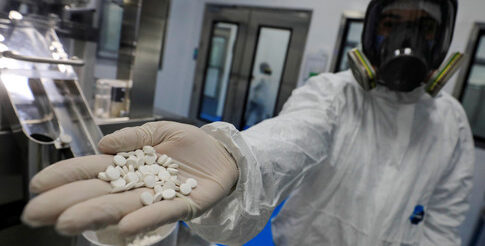Are vaccines enough? To end COVID-19 we need more innovation – and more access | World Economic Forum

There is hope on the horizon. The US Food and Drug Administration is currently tracking more than 560 COVID-19 drug development programmes. But the challenge of taking a new medication from development in a lab to administration in a clinic is two-fold: first, there is the complex and expensive scientific lift of developing new interventions; second, there is the complicated task of making them accessible and affordable. For example, the most promising treatment advances to date involve monoclonal antibodies (mAbs), which are challenging to produce and distribute, currently in limited supply, and expensive – even in high-income settings.
The normal market mechanisms and incentive structures that guide the path of treatments from development to access – which are, arguably, sub-optimal in normal circumstances – are not suited to help combat a global pandemic. This is a situation that calls for new alliances that can speed the journey of COVID-19 innovations from the scientist’s bench to the patient’s bedside across all countries.
MPP was established by Unitaid in 2010, and is a United Nations-backed public health organization that facilitates the development of and access to life-saving medications in low- and middle-income countries. Over the past decade, the organization has worked with product developers and generic manufacturers to secure agreements that delivered 15 billion doses of affordable breakthrough treatments for HIV and hepatitis C to 141 countries. MPP achieves this through an innovative model of negotiating voluntary agreements with patent holders to license their discoveries to a pool accessible to generic manufacturers capable of producing and distributing high-quality, affordable medical interventions.
It’s important for the world’s major pharmaceutical companies to join this effort as well. Among other things, patent pooling provides an orderly process for achieving consensus in addressing a familiar tension: generating private sector investments in biomedical innovation while ensuring equitable access to the products that emerge. This tension is especially evident today.
Yet many pharmaceutical companies may worry about the implications of broadly licensing their IP to a patent pool. They include concerns that agreements designed to serve neglected populations might inadvertently erode market opportunities elsewhere. There also may be misgivings that there will be pressure to provide especially generous licensing terms for COVID-19 interventions, setting a precedent that would be applied to future negotiations for many other medical products.
Coalitions like CEPI are made possible through public-private partnerships. The World Economic Forum is the trusted global platform for stakeholder engagement, bringing together a range of multistakeholders from business, government and civil society to improve the state of the world.
Different from efforts that rely on charitable donations or philanthropic funding, patent pooling seeks a business model that offers a more sustainable solution for increasing access to medical breakthroughs.
Much as a range of treatment options are required to address COVID-19, a range of models should be employed to effectively expand access to these treatments. To be sure, negotiations over product licences, technology transfer arrangements and financing will be complex. Yet multiple stakeholders must come together to take this step if the world is to expand manufacturing, supply and ultimately access to life saving COVID-19 treatments.
